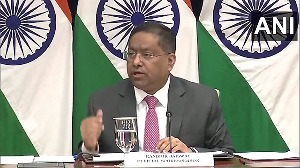Justice Soumitra Sen, against whom the Chief Justice of India has recommended impeachment, is not considering resignation and will defend himself as and when required, his counsel has said.
"At this stage, he is not considering resignation," said senior counsel Subhas Bhattacharya, who is representing the Calcutta High Court judge.
"If showcaused by Parliament, he will appear before it. He will defend himself in accordance with the law," Bhattacharya said.
Justice Sen's wife, Anuradha Sen, said the judge was not taking any calls and was not talking to the media as it was a 'sensitive issue'.
Calcutta HC judge to face impeachment in Parliament
She said Justice Sen's lawyer Bhattacharya will answer queries on his behalf.
About Justice Sen's reaction after hearing about Chief Justice of India's recommendation to impeach him, she said: "Try to put yourself in his situation and you will understand."
Sen will face impeachment proceedings in Parliament -- with the government accepting Chief Justice of India's recommendation to the Prime Minister for his removal on charges of serious financial 'misconduct' -- the second-ever such action against a member of the higher judiciary.
In an internal inquiry held by Chief Justice K G Balakrishnan on the matter, Sen, then a practicing lawyer, was allegedly found to have indulged in financial misconduct prior to his elevation as High Court judge in December, 2003.
He is said to have received Rs 32 lakh as court-appointed receiver in a lawsuit between Steel Authority of India Ltd and Shipping Corporation of India and accused of depositing the amount in his personal account.
Bhattacharya claimed that the case pertains to a period when Sen was not a judge and was a receiver of the High Court.
He said Justice Kalyan Jyoti Sengupta's order had been carried out by Justice Sen and the amount of around Rs 57 lakh including interest had been paid in instalments.
However, adverse remarks made in that order was challenged before a division bench, which ordered deletion of such comments and had also held that the order was passed without jurisdiction, Bhattacharya said.






 © 2025
© 2025